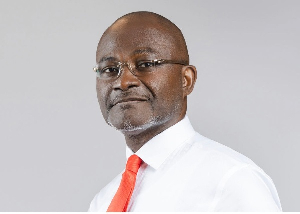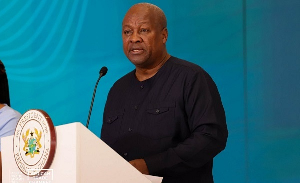In fact, by introducing the free SHS, Akufo-Addo has graciously upheld the international human rights provision on free universal secondary education, which is encapsulated in Article 13 of the International Covenant on Economics, Social and Cultural Rights.
Education, as a matter of fact, drives the development of a nation, thus, the logical approach to improving accessibility and quality is not through political rhetoric and insobrieties, but through well-thought through policies such as the Akufo-Addo’s free SHS.
Considering the enormous benefits therein education, it is, indeed, prudent and somewhat forward-thinking for Akufo-Addo’s government to seek to bridge the ever widening social inequalities chasm through rational distribution of national resources in the form of free SHS.
And, given the fact that the erstwhile ambivalent NDC government needlessly left behind a huge debt, it is, indeed, estimable for Akufo-Addo’s government to afford to implement the seemingly admirable, albeit costly social intervention such as free SHS.
But despite its associated benefits, the opposition NDC operatives have been fighting tooth and nail to scrap the comprehensively free SHS, and replace it with ‘a progressively free policy, where each student will be entitled to just about GH40.00 per term.
Take, for example, after campaigning and voting against the poverty alleviation free SHS during the 2016 election, albeit unsuccessful, the NDC operatives now have the brashness to protest vehemently against the schematic arrangements of the free SHS.
Apparently, the NDC operatives are moving heaven and earth to bring down the infant free SHS, and bizarrely claiming that the scheme is destitute of efficiency.
Let us however be honest, in spite of the initial challenges, the free SHS will suffice. So the endless attacks and unfair criticisms will not and cannot bring the scheme down. But the free SHS policy will rather bring enormous benefits to the students, parents and the nation as a whole.
Of course, the universal free education has been introduced in a number of jurisdictions across our own continent, Africa. Suffice it to state that, in spite of the initial challenges, the policy has sufficed in those jurisdictions. So, why not in Ghana?
In 2007, Uganda became the first country in sub-Saharan Africa to introduce free universal secondary education. Under the secondary scheme, students who get specific grades in each of the four primary school-leaving exams study free in public schools and participating private schools.
The government of Kenya, in 2002, declared a universal free primary school, and followed it up with a free secondary schooling education programme in 2008.
In Namibia, a former South African colony under apartheid, primary education was declared free in 2012, while secondary education became free from 2016.
The poverty alleviation free SHS policy, as a matter of fact, reinforces the United Nations vision on human development and the right to development.
It is, however, worth mentioning that per the right to development, development is shifting from the conventional approach to human rights approach, whereby the focus is on equity and social justice (Mansell and Scot 1994).
It was against that background that the international community agreed to work synergistically to assist the underdeveloped nations in line with the provisions of the UN Declaration on the Right to Development.
Thus far there have been concerted efforts by the international community to concretise the Right to Development by first implementing the eight Millennium Development Goals with a view to developing a global partnership for development (Alston 2005).
Apparently, the MDGS came to an end at the end of 2015 and replaced with the Sustainable Development Goals (SDGs). Under the Sustainable Development Goals, every country would be obliged to meet the targets set therein (UN 2015).
Let us face it, though, as the international community heads toward implementing and monitoring the 2030 Sustainable Development Goals agenda, the human development approach remains useful to articulating the objectives of development and improving people’s well-being by ensuring an equitable, sustainable and stable world.
In hindsight, human development – or the human development approach- is about expanding the richness of human life. It is an approach that is focused on people and their opportunities and choices.
In reality, human development focuses on improving the lives of people rather than assuming that economic growth will lead, automatically, to greater wellbeing for all.
In other words, human development is about giving people more freedom to live lives they value. In effect, this implies developing people’s abilities and giving them a chance to improve upon their lives.
Take, for example, educating a large number of children would build their skills, but it is of little, or no use if they are denied access to jobs, or do not have the right skills for the local labour market.
In essence, human development is, basically, about more choices. It is about providing people with opportunities, not insisting that they make use of them. For no one can guarantee human happiness, and the choices individuals make are for their own good.
The human development approach, developed by the economist Mahbub Ul Haq, is encapsulated in the Nobel laureate Amartya Sen’s work on human capabilities, often framed in terms of whether people are able to “be” and “do” desirable things in life. Examples include-Beings: well fed, sheltered, healthy; Doings: work, education, voting, participating in community life (HDR 2015).
Apparently, since 1990, 2 billion people have been lifted out of low human development, extreme income poverty has been reduced by more than a billion. Every region of the world has seen Human Development Index (HDI) gains (HDR 2015).
In a grand scheme of things, the process of development – human development – in the form of Akufo-Addo’s free SHS, should at least create an environment for people, individually and collectively, to develop to their full potential and to have a reasonable chance of leading productive and creative lives that they value.
Opinions of Saturday, 25 November 2017
Columnist: K. Badu, UK















